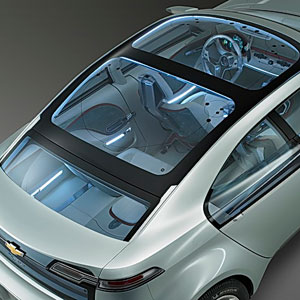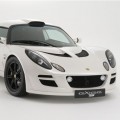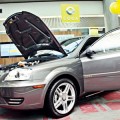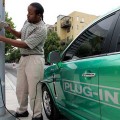The jury is still out after the Green Drive Expo this weekend in Richmond. About 3,000 people attended the event, which was hosted, appropriately, in the Craneway Pavilion, a converted Ford auto assembly plant. The event was sponsored by Autobytel.com, a website selling new and used cars, which focuses on greener transportation alternatives.
All the big names were there, from Prius (which was also well tested as a Google robot car) to the soon-to-be-released and Nissan Leaf, as well as the American Big Three reps, the Chevy Volt and the Ford Escape. There was plenty of demand too, though there was also concern that the cost of the new cars may impede their rapid adoption. “Once there are used electric cars, I’ll buy one,” said Rosana Francescato, who arrived at the event in her smart car. “Even with the rebates, it’s upwards of $20,000.” The Leaf is expected to retail for $33,000, while the Volt will retail for $41,000.
There was also some discussion as to whether the cars live up to their claims. The Volt, for instance, was claimed to achieve 230 mpg, and its onboard gasoline engine was only to be used as a “range extender” to charge the batteries. Testing has proved this to be untrue, or as one reporter, Scott Oldham at Edmunds.com, tweeted, “GM lied to the world about it.” Actually, Popular Mechanics found that it got just 37.5 mpg in city driving, Motor Trend reported that it came in at the high thirties to low forties, while Car and Driver found that, “getting on the nearest highway and commuting with the 80-mph flow of traffic-basically the worst-case scenario-yielded 26 miles.” Considering that the Volt takes 10 hours to recharge using a standard household outlet, users will still have to space out their trips or stay at work for a very long time.
Then there are the other concerns about the impact of a car culture, even a hybrid or electric car culture. For instance, even the greenest electric car still requires pavement and parking lots, which take up space and are paved with a petroleum byproduct.
Some manufacturers have taken steps to avoid another petroleum product—plastic—in their cars. In some, seats and other plastic components have been replaced with more sustainable soy and wheat products—if you get stranded can you eat the backseat?
These flaws and more were on the mind of John Mahoney, another visitor at the fair. “We’re currently in the Model T era of electric cars,” he said, and the fact is that our gas guzzling automobiles and SUVs have come a long way since then. The cars that were highlighted in Richmond are only the beginning.
Read More at NBC Bay Area.
Read More at ABC 7.
Read More at Jalopnik.
Read More at the Mercury News.




